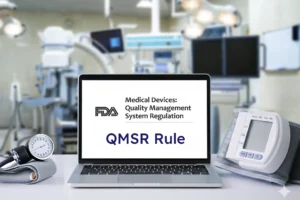On June 18, 2025, the EU Medical Device Coordination Group (MDCG) released MDCG 2025-5, a detailed Q&A document clarifying the rules for in vitro diagnostic (IVD) performance studies under the IVDR. The guidance, aimed primarily at sponsors of IVD performance studies, also addresses manufacturers providing devices for others’ studies and combined study sponsors. It focuses on Articles 57–77 of the IVDR, which cover regulated performance study requirements before and after market placement. As with all MDCG guidance, the document is a non-binding clarification of member states’ views and not a legally binding interpretation.
Key provisions and highlights
The Q&A offers practical details on when and how IVD performance studies must be conducted under the IVDR. It differentiates analytical vs. clinical performance studies, explains who qualifies as study sponsor or investigator, and clarifies reporting obligations. Notably, the document outlines when a formal authorisation application or a simple notification is required (under IVDR Articles 58(1), 58(2), 70(1)) and provides a flow chart (Appendix I) to guide sponsors through these pathways. Other highlights include:
Analytical vs. Clinical Performance: Analytical performance studies (e.g., assessing an assay’s sensitivity, specificity, precision, etc.) are almost always required to demonstrate device performance, unless fully justified otherwise. Clinical performance (studying patient outcomes) may rely on formal studies or on published literature and routine use data if justified.
Sponsor Responsibilities: The guidance clarifies that sponsors can be industry or academic investigators, and spells out each party’s obligations (regardless of whether the study is purely academic research, if it falls under the IVDR definition of a performance study).
Companion Diagnostics & Left-over Samples: Special provisions apply for companion diagnostic studies (devices paired with therapies) and for the use of residual (“left-over”) specimens. For example, some companion-diagnostic studies using only leftover samples may only require notification, not full approval.
Substantial Modifications: Changes to an ongoing study (“substantial modifications”) must be managed under IVDR Article 71. The Q&A explains which amendments trigger a new application or notification.
The document also covers ethical review, safety reporting, and other procedural details. In particular, it emphasises that analytical performance must always be demonstrated via study data, whereas clinical performance can be based on a combination of studies, peer-reviewed literature, or routine testing data. The MDCG clarifies that all IVD performance studies that meet the IVDR definition fall under Article 57, with additional obligations under Articles 58–70 for specific study types.
Context and implications
The MDCG 2025-5 Q&A complements earlier MDCG guidance on IVD evidence. For instance, MDCG 2024-4 addressed safety reporting in IVD studies, and the 2022 Guidance on clinical evidence covered general principles. Together, these documents aim to fill gaps left by the IVDR text. Notably, the Q&A flow chart (Appendix I) is a practical tool to determine the right regulatory route for any given study, which should help sponsors avoid delays.
Conclusion
MDCG 2025-5 is timely, as the EU continues to implement IVDR mandates on performance studies and market surveillance. Manufacturers and study sponsors are expected to review it closely as they plan trials and evaluations. While the guidance is officially non-binding, its clarifications will likely influence how competent authorities evaluate study applications and how companies prepare their dossiers. Stakeholders are advised to consult the Q&A alongside the IVDR text to ensure full compliance with the new performance study requirements.




